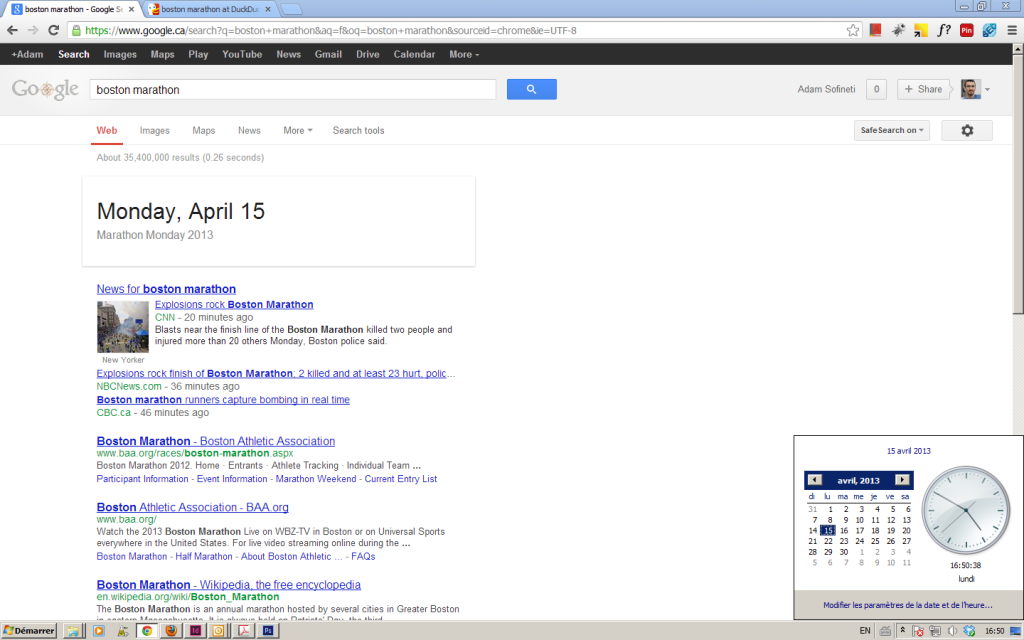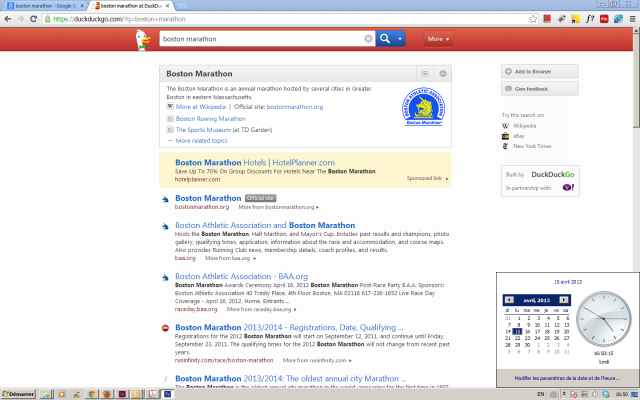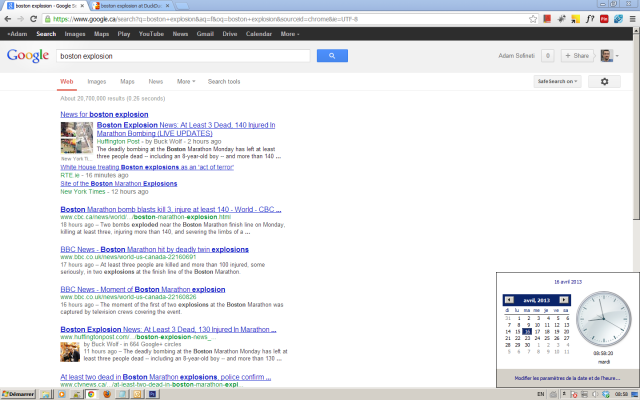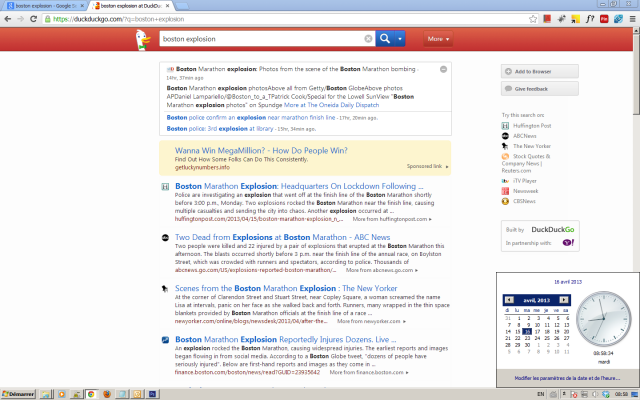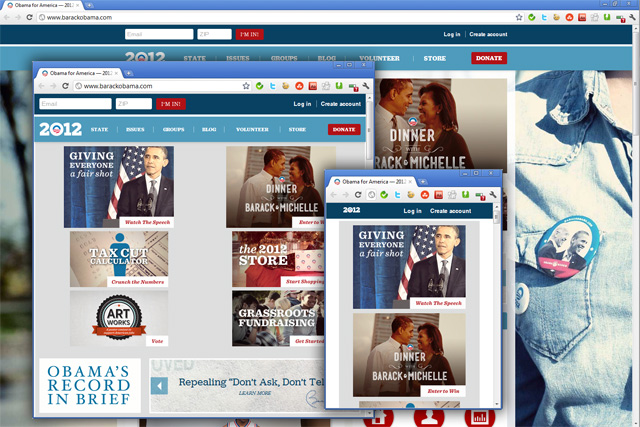
“The naughty children”, 1849. Source: Wikipedia
Friday morning, at the Introduction to Information Studies class, we were presented some of the main critiques of the information society and a few arguments used by technology skeptics. One of the cases presented by our professor, was about Loys Bonod, a French teacher that went to great lengths to prove his students are cheating. In the end he wrote a blog post on his website, Comment j’ai pourri le web (How I rotted the web), where he describes in details his tactic. Here is a brief timeline of the events:
The cheat
Every year, he would ask his students to write an essay about certain subject related to French literature. They would have about a month to do their research and come up with a text. At one point he noticed a recurring pattern of a strange syntactic construction in several of the essays and after a quick search on Google, he realized that his students bought online for less than 2 € an essay on the subject. Later that year, another student chose the shortcut of a ready-made essay and he was caught cheating.
Setting up the trap
At the end of the Summer of that year he found a XVIIth century poem that had no traces on the Internet. The author is Charles de Vion d’Alibray, a very little known character of the French literature.
First he registered an account on Wikipedia and claims to have made some editing to prove himself as a legitimate and credible contributor.
He also registered on several forums used by students, as a fake student and asked questions about this author, than he created another account to answer his own questions with an in apparent scholarly fashion, but his answers were totally wrong.
Finally, he wrote an essay that he submitted to a couple of websites selling essays. These websites had accepted his text without verifying the correctness of the content.
He made sure to post links all over the place on the Internet, so that his online trap gets good page rank on Google.
Once everything was in place, he gave his students two weeks, to write an essay about this poem. He asked them to be original, as he was curios about their personal opinion.
The catch
Out of 65 students, 51 have fallen into his trap by copying to diverse degree from the Internet, the information they have found, without making any background check to see if what they are copying is correct or not. They had used Wikipedia blindly without verifying the authenticity of the sources. The worst errors were those of the interpretation, were complete phrases were recopied, denoting a complete lack of understanding of the poem and of the methodology of writing essays.
He did not gave grades on this assignment, but he managed to have the students blush when they realized they were caught cheating.
Loys Bonod’s conclusion
I will try to translate his conclusion to best of my knowledge:
It is recommended that teachers introduce students to the NTIC (New Technologies of Information and Communication).
I think I’ve done my job and it is self concluding: students in high school do not have the maturity to take any advantage of the digital when it comes to humanities. Their servitude to the Internet goes against the autonomy of thought and personal culture that the school is supposed to give them. Wanting to enter the digital into the school, we forget that he has already entered a long time ago, and in its wild form, he digs the grave of the republican education.
With this educational experience I wanted to show students that teachers can sometimes master new technologies as well as them or better than them.
I then wanted to demonstrate that any content posted on the web is not necessarily validated content, or it can be validated for reasons which fall within the intellectual imposture.
And finally, I wanted to prove that more than laziness, it is a serious lack of confidence that pushes them to copy what they find elsewhere, and that endorsing the thoughts of others, they deny themselves and disappear.
Did I succeeded? It would be to my students to say. One thing is certain: this experience, I think, marked my students and I have a fine reputation in my school.
For my part, I do not believe at all in a possible moralization of digital in schools.
And I defend this paradox: there is no real benefit to the digital unless the mind was built without him.
Update: for an alternative translation, consider proximity1’s comment, as I might have missed some of the nuances of Loys Bonod’s article.
Wikipedia’s reaction
Mr. Bonod’s reputation reached beyond the walls of its school and he’s now given as an example of possible vandalism of Wikipedia, next to men with big penises and friends of gays.
My colleagues’ reaction
While information science at its origins was dealing with archives and libraries, in the pas few decades because of the digital revolution, things are changing fast and information professionals have to adapt fast to new realities.
As a mandatory, introductory course, we’re quite many in the amphitheater and often the reaction of some of my colleagues denote mistrust of new technologies and in few cases, I even felt hatred of anything that would involve a computer, or the Internet.
The story of Mr. Bonod is a juicy bone, for such people that fear technology. What better proof you need to demonstrate that Wikipedia is not a reliable source of scholarly information, than the editing of the Charles de Vion d’Alibray article?
My conclusion: the palaeontologist is not a veterinarian
I have all the respect for Mr. Bonod’s experiment, he put in a lot of time and effort to show kids that stuff on the Internet have to be taken with a grain of salt. What really bothers me is his conclusion that the mind should be formed in a bubble, isolated from the digital world and only exposed to the Internet when a teacher or someone else considers it to be ready.
This is a complete non-sense.
How does Mr. Bonod think it’s even possible to escape the Internet? It’s everywhere, it’s not just the laptops and cellphones that are connected, but those teenager’s TV’s and game consoles too; every day there are more and more devices that get hooked up and educators should stop ignoring it.
How can he foresee the job market his students will have to fit in? I can guarantee, it’ll be totally different from what he has witnessed before and instead of discouraging his students to use the Internet, he should teach team and encourage them to use it correctly and in a constructive way. Vandalizing Wikipedia was maybe to extreme as a pedagogical method.
People like Bonod, I see them as palaeontologists, enamored and passionate about a world long gone. There is nothing wrong to be a palaeontologist, but when your fluffy kitten needs a vaccine or your dog has an indigestion, would you take him to a palaeontology museum or to a veterinarian? I bet you would opt to take your pet to the vet clinic, but what if the doctor is not a veterinarian, but a guy specialized in dinosaurs. He will probably have some basic knowledge about cats and dogs, but he’s mind is filled with ancient bones of Triceratops Horridus and he’s handling your darling like it would been an petrified fossil.
While our cats and dogs are in safe hands with the veterinarians, when it comes to schools, often I wonder about some teachers, the Loys Bonods of the world and their curriculum.
Many journalists hate bloggers and blogs, they feel threatened by how easy it is to write, publish and distribute a story. Photographers hate stock photo website, because they dilute the price of average quality images. Graphic designers a weary of websites like 99designs.ca because people would design a logo for 200$.
The world is changing and educators should not just accept these changes, but embrace them, embed them and use them as tools to open up new perspectives in their work of forming minds and souls.
As the French philosopher Michel Serres pointed out, we shouldn’t be concerned with what we are loosing because of the digital revolution, we should rather focus on what we gain. He actually had a very interesting dialog with Alain Finkielkraut on Radio France Culture about the education in the world that is coming. Here is the link to the podcast, the interview is in French.
When I look around my class and see some of my classmates, future information professionals, people that in a couple of years will decide about library budgets, and archive development, their hatred, fear and complete misunderstanding of the direction our world is going scares me and I wonder, what on Earth are they doing here?
In the second half of our class, we had Martin Lessard, a Montreal based web strategy consultant, invited to talk about the role of social media in a world of information overload. It was quite funny to hear him talk about Loys Bonod’s case, but from a completely different perspective than our professor. I saw many shaking heads in disapproval around me.
In conclusion, those that are passionate about dinos, should not work with kittens.


